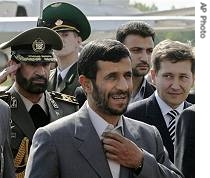2007年VOA标准英语-UN Nuclear Chief: Iran 3-8 Years Away From Bomb
搜索关注在线英语听力室公众号:tingroom,领取免费英语资料大礼包。
(单词翻译)
By Sonja PaceLondon
24 May 2007
The head of the U.N. nuclear watchdog group, the IAEA, says Iran is probably three to eight years away from being able to produce a nuclear bomb and urges negotiations1 to keep that from happening. But, in Washington, President Bush is calling for tougher sanctions against Tehran. VOA's Sonja Pace reports from London.
Speaking at a news conference in Luxembourg, IAEA chief Mohamed ElBaradei said he agrees with U.S. intelligence assessments2 that if Iran wants to develop nuclear weapons, it is three to eight years away from being able to do so.
He said there is no doubt that Iran is increasing its capacity, but he also urged an easing of the rhetoric3 and the start of comprehensive negotiations to contain the threat of a nuclear arms race.
"I see a proliferation issue that is deteriorating4, that we are heading toward a confrontation," he said. "I wanted to make it clear that people understand they need to assess their strategy to do something about it so that we can contain an emerging threat to a region that is, to say the least, an absolute mess right now."
ElBaradei was in Luxembourg for an international conference on nuclear arms technology.
Iran insists its nuclear program is for peaceful energy purposes only. But the United States and many other nations say Iran is seeking to develop nuclear weapons.
The U.N. Security Council has already imposed sanctions on Iran for refusing to suspend its uranium enrichment program. The U.S. and other nations say such a halt is a prelude5 to any negotiations. But the most recent IAEA report, issued Wednesday, said Tehran has not halted, but has actually expanded its uranium-enrichment activities.
In Washington, President Bush said Iran knows what it has to do.
"The world has spoken and said: No nuclear weapons programs. And yet they are constantly ignoring the demands," he said. "My view is that we need to strengthen our sanction regime."
Mr. Bush said the U.S. will work with its European partners to develop further sanctions. The president said he will also discuss the issue with the leaders of Russia and China.
"The first thing that these leaders have got to understand is that an Iran with a nuclear weapon would be incredibly destabilizing for the world," he said.
The United States will need the support of Russia and China to get additional sanctions approved in the UN Security Council.
Recently, IAEA chief ElBaradei suggested that Iran should be allowed to keep some elements of its nuclear enrichment program. His comments, made to the media, have angered U.S. officials. On Thursday, a senior U.S. diplomat6, speaking in Washington, called ElBaradei's comments "inappropriate" and said a delegation7 of American and European officials is to meet with the IAEA chief in Vienna.
 |
| Mahmoud Ahmadinejad, center, 21 May 2007 |
 收听单词发音
收听单词发音 




